中考英语复习语法突破第十一节连词 课件(共34张PPT)
文档属性
| 名称 | 中考英语复习语法突破第十一节连词 课件(共34张PPT) |  | |
| 格式 | ppt | ||
| 文件大小 | 547.0KB | ||
| 资源类型 | 教案 | ||
| 版本资源 | 通用版 | ||
| 科目 | 英语 | ||
| 更新时间 | 2024-03-01 16:57:07 | ||
图片预览

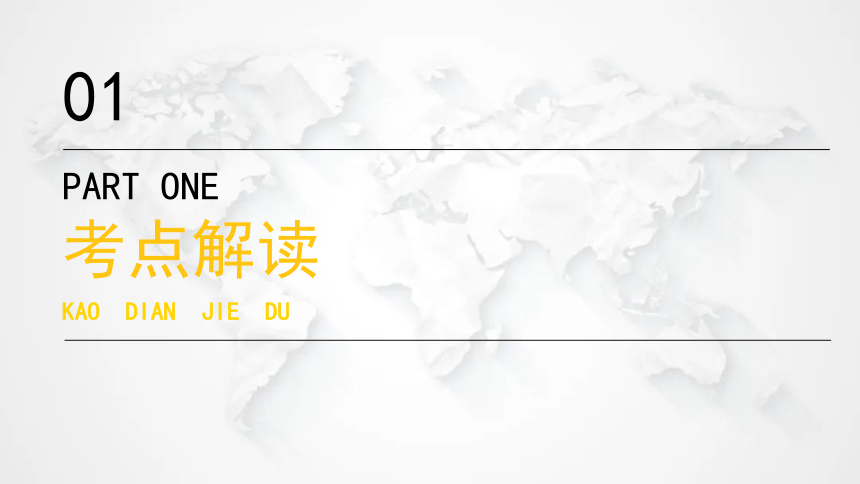
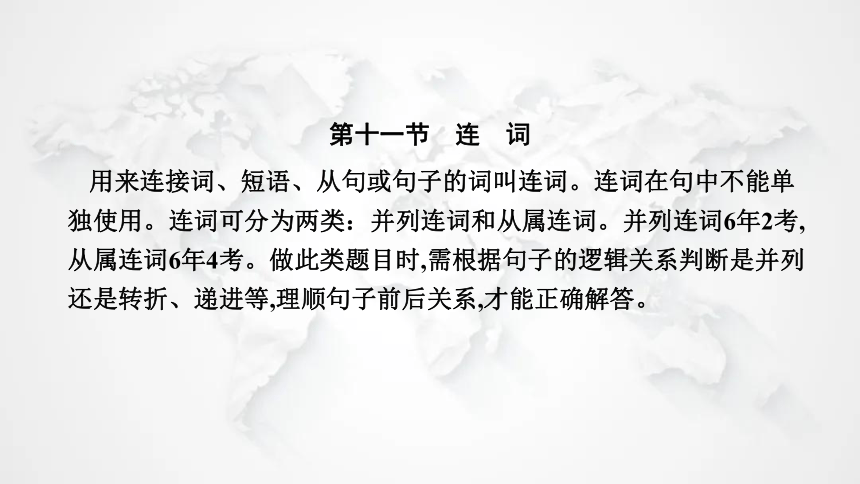
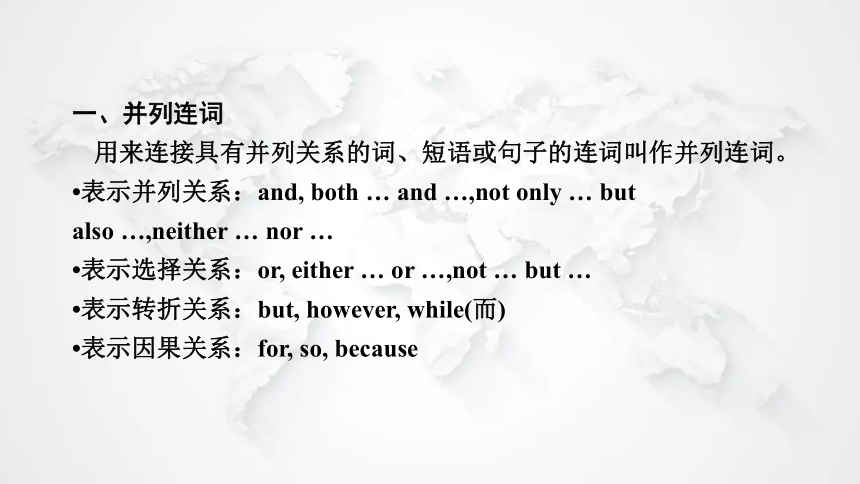
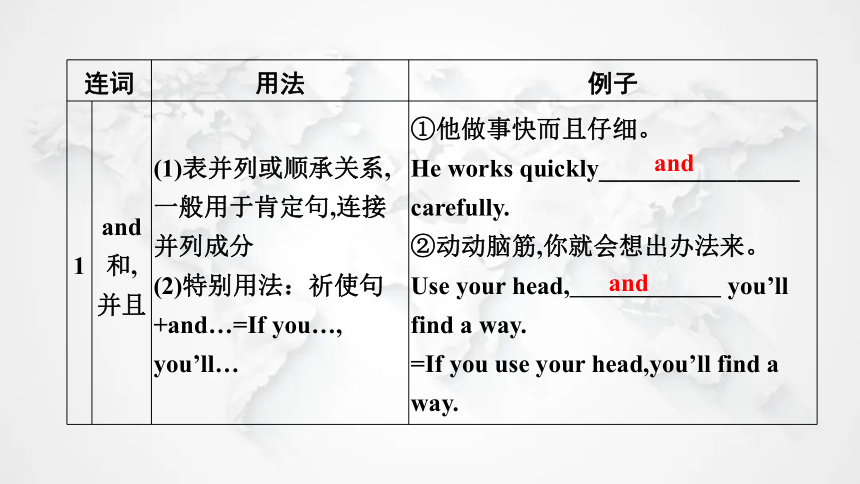
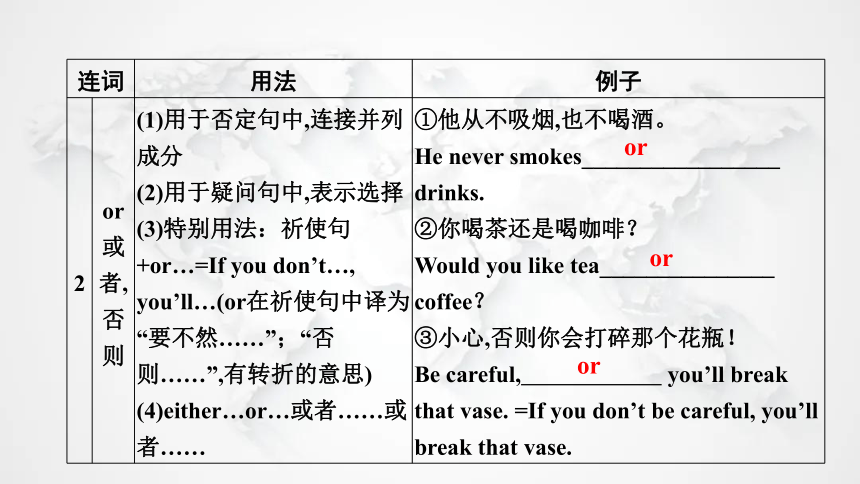
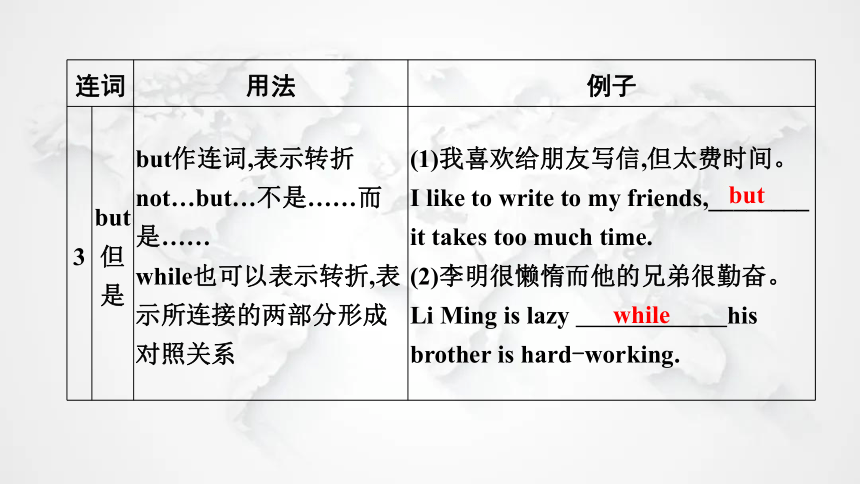
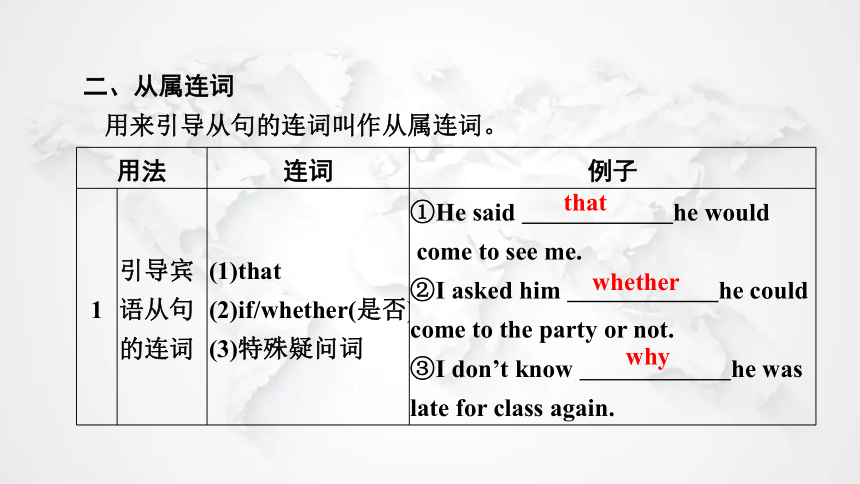
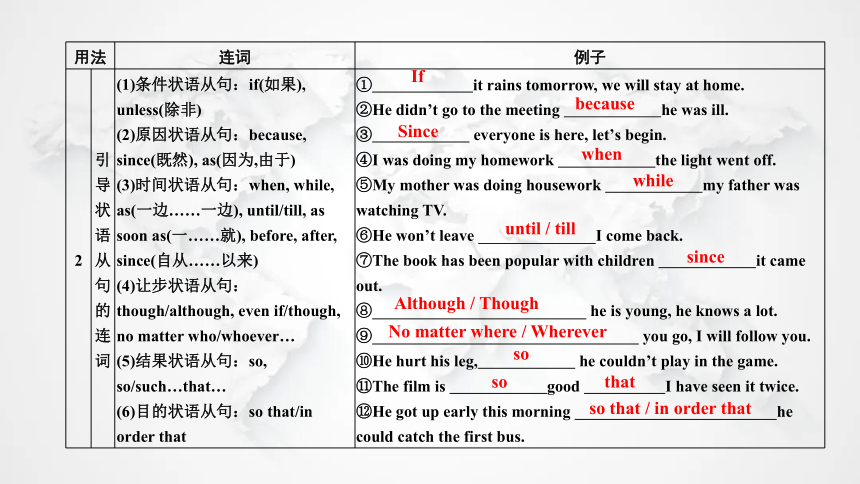
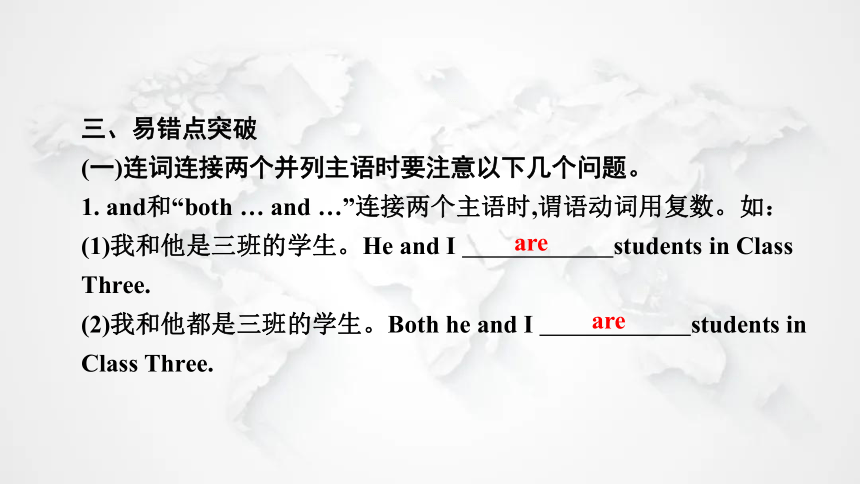
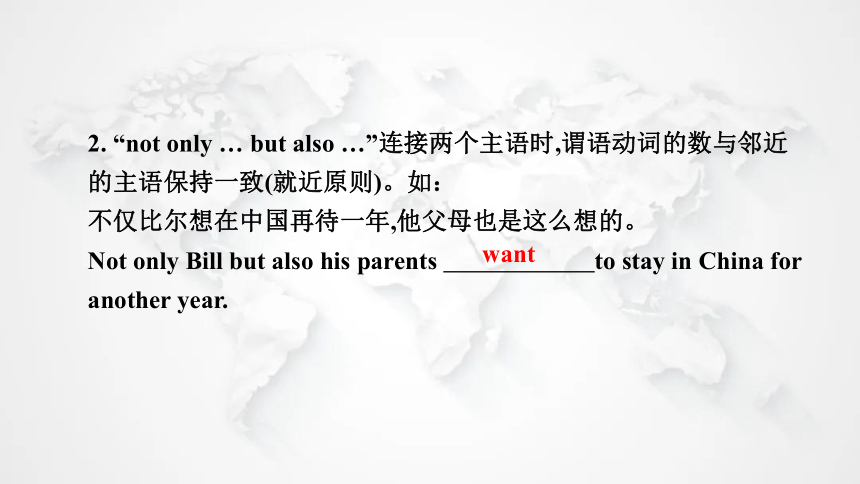
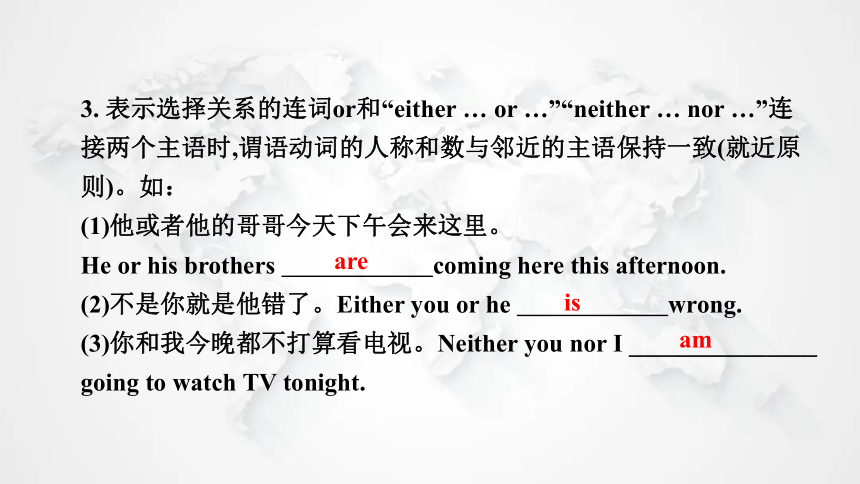
文档简介
(共34张PPT)
考点解读
01
KAO DIAN JIE DU
满分突破
02
MAN FEN TU PO
真题链接
03
ZHEN TI LIAN JIE
CONTENTS
目录
模拟突破
04
MO NI TU PO
考点解读
KAO DIAN JIE DU
PART ONE
01
第十一节 连 词
用来连接词、短语、从句或句子的词叫连词。连词在句中不能单独使用。连词可分为两类:并列连词和从属连词。并列连词6年2考,从属连词6年4考。做此类题目时,需根据句子的逻辑关系判断是并列还是转折、递进等,理顺句子前后关系,才能正确解答。
一、并列连词
用来连接具有并列关系的词、短语或句子的连词叫作并列连词。
表示并列关系:and, both … and …,not only … but also …,neither … nor …
表示选择关系:or, either … or …,not … but …
表示转折关系:but, however, while(而)
表示因果关系:for, so, because
连词 用法 例子
1 and
和,
并且 (1)表并列或顺承关系,一般用于肯定句,连接并列成分
(2)特别用法:祈使句+and…=If you…, you’ll… ①他做事快而且仔细。
He works quickly________________ carefully.
②动动脑筋,你就会想出办法来。
Use your head, you’ll find a way.
=If you use your head,you’ll find a way.
and
and
连词 用法 例子
2 or
或者,
否则 (1)用于否定句中,连接并列成分
(2)用于疑问句中,表示选择
(3)特别用法:祈使句+or…=If you don’t…, you’ll…(or在祈使句中译为“要不然……”;“否则……”,有转折的意思)
(4)either…or…或者……或者…… ①他从不吸烟,也不喝酒。
He never smokes_________________ drinks.
②你喝茶还是喝咖啡?
Would you like tea_______________ coffee?
③小心,否则你会打碎那个花瓶!
Be careful, you’ll break that vase. =If you don’t be careful, you’ll break that vase.
or
or
or
连词 用法 例子
3 but
但是 but作连词,表示转折
not…but…不是……而是……
while也可以表示转折,表示所连接的两部分形成对照关系 (1)我喜欢给朋友写信,但太费时间。
I like to write to my friends,________ it takes too much time.
(2)李明很懒惰而他的兄弟很勤奋。
Li Ming is lazy his brother is hard-working.
but
while
二、从属连词
用来引导从句的连词叫作从属连词。
用法 连词 例子
1 引导宾语从句的连词 (1)that
(2)if/whether(是否)
(3)特殊疑问词 ①He said he would
come to see me.
②I asked him he could come to the party or not.
③I don’t know he was late for class again.
that
whether
why
用法 连词 例子
2 引导状语从句的连词 (1)条件状语从句:if(如果), unless(除非)
(2)原因状语从句:because, since(既然), as(因为,由于)
(3)时间状语从句:when, while, as(一边……一边), until/till, as soon as(一……就), before, after, since(自从……以来)
(4)让步状语从句:though/although, even if/though, no matter who/whoever…
(5)结果状语从句:so, so/such…that…
(6)目的状语从句:so that/in order that ① it rains tomorrow, we will stay at home.
②He didn’t go to the meeting he was ill.
③ everyone is here, let’s begin.
④I was doing my homework the light went off.
⑤My mother was doing housework my father was watching TV.
⑥He won’t leave I come back.
⑦The book has been popular with children it came out.
⑧ he is young, he knows a lot.
⑨ you go, I will follow you.
⑩He hurt his leg, he couldn’t play in the game.
The film is good I have seen it twice.
He got up early this morning he could catch the first bus.
If
because
Since
when
while
until / till
since
Although / Though
No matter where / Wherever
so
so
that
so that / in order that
三、易错点突破
(一)连词连接两个并列主语时要注意以下几个问题。
1. and和“both … and …”连接两个主语时,谓语动词用复数。如:
(1)我和他是三班的学生。He and I students in Class Three.
(2)我和他都是三班的学生。Both he and I students in Class Three.
are
are
2. “not only … but also …”连接两个主语时,谓语动词的数与邻近的主语保持一致(就近原则)。如:
不仅比尔想在中国再待一年,他父母也是这么想的。
Not only Bill but also his parents to stay in China for another year.
want
3. 表示选择关系的连词or和“either … or …”“neither … nor …”连接两个主语时,谓语动词的人称和数与邻近的主语保持一致(就近原则)。如:
(1)他或者他的哥哥今天下午会来这里。
He or his brothers coming here this afternoon.
(2)不是你就是他错了。Either you or he wrong.
(3)你和我今晚都不打算看电视。Neither you nor I _______________ going to watch TV tonight.
are
is
am
4. as well as, with, along with, together with, except, but, like, rather than, no less than, more than, besides, including连接两个主语时,谓语动词的数与前面的一个主语保持一致(就远原则)。如:
(1)这位老师和学生们正在图书馆看书。
The teacher as well as the students reading in the library.
(2)学生们和这位老师正在图书馆看书。
The students as well as the teacher reading in the library.
is
are
(二)使用and和or时要注意以下几点。
1. 一般情况下,否定句中的and 要变为or。
如:那个女孩既不会唱歌也不会跳舞。The girl can’t sing________ dance.
2. 连接的两个部分都有否定词,应使用and连接。
如:大部分人认为月球上没有水和空气。
Most people think there is no water no air on the moon.
or
and
3. 不能把一些固定搭配中的and变为or。
如:I don’t like fish and chips. 我不喜欢炸鱼薯条。
满分突破
MAN FEN TU PO
PART TWO
02
一、连词在语法选择中的考查
在语法选择中,连词主要是根据前后句子之间意思的关联推测出来,需要注意的是先看整个句子内部的联系,再看该句和上下文的联系。主要考查并列连词和从属连词,偶尔会考查连词词组。
1. (2023·广东中考·37题)It had a lot of fun training programs,
he enjoyed all of them.
A. or B. but C. and
C
2. (2023·广东中考·38题)There he was often asked he liked space camps so much.
A. why B. when C. where
3. (2023·广州中考·6题)Little Six didn’t have a strong body,________ he had a strong will.
A. and B. but C. because D. so
A
B
4. (2023·广州中考·7题)He decided he would get stronger.
A. what B. why C. when D. that
5. (2023·广州华师大附中一模)He quickly joins up with a group of monkeys he finally returns to his family and understands the meaning of responsibility.
A. but B. although C. if D. so
D
A
6. (2023·广州一模) , as soon as he tries the Chinese-style dish, he feels he is eating a new type of vegetable.
A. Anyway B. What’s more C. However D. Although
7. (2023·广州三模)I remember a time at age 17 I was a busboy, and I heard a father tell his little boy,“ you do not do well in school, you will end up like him. ”
A. If B. So C. But D. Until
C
A
8. (2022·广州中考·9题) I took my hand out of the water, I noticed that the water was a lot dirtier than I thought.
A. If B. Unless C. When D. Though
C
二、连词在短文填空中的考查
两个句子之间缺少连词,缺少的连词一般放在句首,首字母需要大写。根据上下文,推断出所缺连词。
1.
(2023·广东中考·46题)For example, people chose horse-tail hair instead of pig hair pig hair was too hard.
2. (2021·广东中考·70题)But Lao Pan did not begin to understand China he and his family took a 3-month drive around the country.
it either be because what else by invent clean popular habit hundred
because
until
真题链接
ZHEN TI LIAN JIE
PART THREE
03
( )1. Ice-cream is delicious, we can’t eat too much. (2023·西藏自治区)
A. and B. so C. because D. but
( )2. It is really dangerous people run the red traffic light. (2023·长春市)
A. if B. unless C. though D. until
D
A
( )3. My hometown has changed a lot the subway was put into use. (2023·青岛市)
A. unless B. since C. if D. when
( )4. You won’t fully experience the culture of a foreign country you go there in person. (2022·安徽省)
A. because B. unless C. as soon as D. as long as
B
B
( )5. For your safety, you mustn’t get close to the train it stops. (2022·云南省)
A. while B. when C. since D. until
( )6. Hurry up, you will miss the beginning of the concert. (2023·河北省)
A. so B. or C. and D. but
D
B
( )7. It was difficult to climb the mountain, Sam got to the top at last.
(2023·北京市)
A. or B. so C. for D. but
( )8. You should turn off the lights you leave the room. (2023·天津市)
A. until B. before C. although D. so
D
B
( )9. Life is like a one-way race, treasure every moment as time cannot be won again.
(2021·南通市)
A. so B. and C. or D. but
A
( )10. David, go to bed early, you will feel sleepy in class tomorrow.
(2023·丹东市)
A. and B. unless C. or D. but
C
模拟突破
MO NI TU PO
PART FOUR
04
语法选择(主要考查连词)(2023·东莞市三模)
Once upon a time, there was an old woman. Her son was really lazy and did nothing at all. The old woman became 1 about his future. One day, she said to her son, “I hope you can go to this island and find some treasure. ” After saying that, she gave 2 son a bag. It was her son’s 3 time to go to a place so far away. So she prepared some food, some clothes, some money and a map in the bag.
The son started the long journey the next day. During the long journey, he had to cook meals for himself. 4 his way to the island, he met many people. Some of them helped him. Three months 5 ,he got to the island. 6 ,he could not find any treasure. He felt quite sad and began to return home. On his way back home, he could 7 look after himself. And surprisingly, he met those people 8 helped him before. This time he stayed with them for a few days and helped them with some farm work.
When he got home, he told his mother that he could not find any treasure. His mother smiled and said, “My son, to be honest, there is no treasure in 9 island. But I think you 10 the most valuable treasure in life already. This is something you can only learn through the course of life. ”
( )1. A. worry B. worries C. worried
( )2. A. she B. her C. hers
( )3. A. the first B. one C. first
( )4. A. On B. In C. At
( )5. A. ago B. later C. after
( )6. A. But B. However C. Because
( )7. A. easily B. easy C. easier
( )8. A. which B. who C. when
( )9. A. a B. an C. the
( )10. A. will find B. have found C. find
C
B
C
A
B
B
A
B
C
B
考点解读
01
KAO DIAN JIE DU
满分突破
02
MAN FEN TU PO
真题链接
03
ZHEN TI LIAN JIE
CONTENTS
目录
模拟突破
04
MO NI TU PO
考点解读
KAO DIAN JIE DU
PART ONE
01
第十一节 连 词
用来连接词、短语、从句或句子的词叫连词。连词在句中不能单独使用。连词可分为两类:并列连词和从属连词。并列连词6年2考,从属连词6年4考。做此类题目时,需根据句子的逻辑关系判断是并列还是转折、递进等,理顺句子前后关系,才能正确解答。
一、并列连词
用来连接具有并列关系的词、短语或句子的连词叫作并列连词。
表示并列关系:and, both … and …,not only … but also …,neither … nor …
表示选择关系:or, either … or …,not … but …
表示转折关系:but, however, while(而)
表示因果关系:for, so, because
连词 用法 例子
1 and
和,
并且 (1)表并列或顺承关系,一般用于肯定句,连接并列成分
(2)特别用法:祈使句+and…=If you…, you’ll… ①他做事快而且仔细。
He works quickly________________ carefully.
②动动脑筋,你就会想出办法来。
Use your head, you’ll find a way.
=If you use your head,you’ll find a way.
and
and
连词 用法 例子
2 or
或者,
否则 (1)用于否定句中,连接并列成分
(2)用于疑问句中,表示选择
(3)特别用法:祈使句+or…=If you don’t…, you’ll…(or在祈使句中译为“要不然……”;“否则……”,有转折的意思)
(4)either…or…或者……或者…… ①他从不吸烟,也不喝酒。
He never smokes_________________ drinks.
②你喝茶还是喝咖啡?
Would you like tea_______________ coffee?
③小心,否则你会打碎那个花瓶!
Be careful, you’ll break that vase. =If you don’t be careful, you’ll break that vase.
or
or
or
连词 用法 例子
3 but
但是 but作连词,表示转折
not…but…不是……而是……
while也可以表示转折,表示所连接的两部分形成对照关系 (1)我喜欢给朋友写信,但太费时间。
I like to write to my friends,________ it takes too much time.
(2)李明很懒惰而他的兄弟很勤奋。
Li Ming is lazy his brother is hard-working.
but
while
二、从属连词
用来引导从句的连词叫作从属连词。
用法 连词 例子
1 引导宾语从句的连词 (1)that
(2)if/whether(是否)
(3)特殊疑问词 ①He said he would
come to see me.
②I asked him he could come to the party or not.
③I don’t know he was late for class again.
that
whether
why
用法 连词 例子
2 引导状语从句的连词 (1)条件状语从句:if(如果), unless(除非)
(2)原因状语从句:because, since(既然), as(因为,由于)
(3)时间状语从句:when, while, as(一边……一边), until/till, as soon as(一……就), before, after, since(自从……以来)
(4)让步状语从句:though/although, even if/though, no matter who/whoever…
(5)结果状语从句:so, so/such…that…
(6)目的状语从句:so that/in order that ① it rains tomorrow, we will stay at home.
②He didn’t go to the meeting he was ill.
③ everyone is here, let’s begin.
④I was doing my homework the light went off.
⑤My mother was doing housework my father was watching TV.
⑥He won’t leave I come back.
⑦The book has been popular with children it came out.
⑧ he is young, he knows a lot.
⑨ you go, I will follow you.
⑩He hurt his leg, he couldn’t play in the game.
The film is good I have seen it twice.
He got up early this morning he could catch the first bus.
If
because
Since
when
while
until / till
since
Although / Though
No matter where / Wherever
so
so
that
so that / in order that
三、易错点突破
(一)连词连接两个并列主语时要注意以下几个问题。
1. and和“both … and …”连接两个主语时,谓语动词用复数。如:
(1)我和他是三班的学生。He and I students in Class Three.
(2)我和他都是三班的学生。Both he and I students in Class Three.
are
are
2. “not only … but also …”连接两个主语时,谓语动词的数与邻近的主语保持一致(就近原则)。如:
不仅比尔想在中国再待一年,他父母也是这么想的。
Not only Bill but also his parents to stay in China for another year.
want
3. 表示选择关系的连词or和“either … or …”“neither … nor …”连接两个主语时,谓语动词的人称和数与邻近的主语保持一致(就近原则)。如:
(1)他或者他的哥哥今天下午会来这里。
He or his brothers coming here this afternoon.
(2)不是你就是他错了。Either you or he wrong.
(3)你和我今晚都不打算看电视。Neither you nor I _______________ going to watch TV tonight.
are
is
am
4. as well as, with, along with, together with, except, but, like, rather than, no less than, more than, besides, including连接两个主语时,谓语动词的数与前面的一个主语保持一致(就远原则)。如:
(1)这位老师和学生们正在图书馆看书。
The teacher as well as the students reading in the library.
(2)学生们和这位老师正在图书馆看书。
The students as well as the teacher reading in the library.
is
are
(二)使用and和or时要注意以下几点。
1. 一般情况下,否定句中的and 要变为or。
如:那个女孩既不会唱歌也不会跳舞。The girl can’t sing________ dance.
2. 连接的两个部分都有否定词,应使用and连接。
如:大部分人认为月球上没有水和空气。
Most people think there is no water no air on the moon.
or
and
3. 不能把一些固定搭配中的and变为or。
如:I don’t like fish and chips. 我不喜欢炸鱼薯条。
满分突破
MAN FEN TU PO
PART TWO
02
一、连词在语法选择中的考查
在语法选择中,连词主要是根据前后句子之间意思的关联推测出来,需要注意的是先看整个句子内部的联系,再看该句和上下文的联系。主要考查并列连词和从属连词,偶尔会考查连词词组。
1. (2023·广东中考·37题)It had a lot of fun training programs,
he enjoyed all of them.
A. or B. but C. and
C
2. (2023·广东中考·38题)There he was often asked he liked space camps so much.
A. why B. when C. where
3. (2023·广州中考·6题)Little Six didn’t have a strong body,________ he had a strong will.
A. and B. but C. because D. so
A
B
4. (2023·广州中考·7题)He decided he would get stronger.
A. what B. why C. when D. that
5. (2023·广州华师大附中一模)He quickly joins up with a group of monkeys he finally returns to his family and understands the meaning of responsibility.
A. but B. although C. if D. so
D
A
6. (2023·广州一模) , as soon as he tries the Chinese-style dish, he feels he is eating a new type of vegetable.
A. Anyway B. What’s more C. However D. Although
7. (2023·广州三模)I remember a time at age 17 I was a busboy, and I heard a father tell his little boy,“ you do not do well in school, you will end up like him. ”
A. If B. So C. But D. Until
C
A
8. (2022·广州中考·9题) I took my hand out of the water, I noticed that the water was a lot dirtier than I thought.
A. If B. Unless C. When D. Though
C
二、连词在短文填空中的考查
两个句子之间缺少连词,缺少的连词一般放在句首,首字母需要大写。根据上下文,推断出所缺连词。
1.
(2023·广东中考·46题)For example, people chose horse-tail hair instead of pig hair pig hair was too hard.
2. (2021·广东中考·70题)But Lao Pan did not begin to understand China he and his family took a 3-month drive around the country.
it either be because what else by invent clean popular habit hundred
because
until
真题链接
ZHEN TI LIAN JIE
PART THREE
03
( )1. Ice-cream is delicious, we can’t eat too much. (2023·西藏自治区)
A. and B. so C. because D. but
( )2. It is really dangerous people run the red traffic light. (2023·长春市)
A. if B. unless C. though D. until
D
A
( )3. My hometown has changed a lot the subway was put into use. (2023·青岛市)
A. unless B. since C. if D. when
( )4. You won’t fully experience the culture of a foreign country you go there in person. (2022·安徽省)
A. because B. unless C. as soon as D. as long as
B
B
( )5. For your safety, you mustn’t get close to the train it stops. (2022·云南省)
A. while B. when C. since D. until
( )6. Hurry up, you will miss the beginning of the concert. (2023·河北省)
A. so B. or C. and D. but
D
B
( )7. It was difficult to climb the mountain, Sam got to the top at last.
(2023·北京市)
A. or B. so C. for D. but
( )8. You should turn off the lights you leave the room. (2023·天津市)
A. until B. before C. although D. so
D
B
( )9. Life is like a one-way race, treasure every moment as time cannot be won again.
(2021·南通市)
A. so B. and C. or D. but
A
( )10. David, go to bed early, you will feel sleepy in class tomorrow.
(2023·丹东市)
A. and B. unless C. or D. but
C
模拟突破
MO NI TU PO
PART FOUR
04
语法选择(主要考查连词)(2023·东莞市三模)
Once upon a time, there was an old woman. Her son was really lazy and did nothing at all. The old woman became 1 about his future. One day, she said to her son, “I hope you can go to this island and find some treasure. ” After saying that, she gave 2 son a bag. It was her son’s 3 time to go to a place so far away. So she prepared some food, some clothes, some money and a map in the bag.
The son started the long journey the next day. During the long journey, he had to cook meals for himself. 4 his way to the island, he met many people. Some of them helped him. Three months 5 ,he got to the island. 6 ,he could not find any treasure. He felt quite sad and began to return home. On his way back home, he could 7 look after himself. And surprisingly, he met those people 8 helped him before. This time he stayed with them for a few days and helped them with some farm work.
When he got home, he told his mother that he could not find any treasure. His mother smiled and said, “My son, to be honest, there is no treasure in 9 island. But I think you 10 the most valuable treasure in life already. This is something you can only learn through the course of life. ”
( )1. A. worry B. worries C. worried
( )2. A. she B. her C. hers
( )3. A. the first B. one C. first
( )4. A. On B. In C. At
( )5. A. ago B. later C. after
( )6. A. But B. However C. Because
( )7. A. easily B. easy C. easier
( )8. A. which B. who C. when
( )9. A. a B. an C. the
( )10. A. will find B. have found C. find
C
B
C
A
B
B
A
B
C
B
同课章节目录
- 词法
- 名词
- 动词和动词短语
- 动词语态
- 动词时态
- 助动词和情态动词
- 非谓语动词
- 冠词
- 代词
- 数词和量词
- 形容词副词及其比较等级
- 介词和介词短语
- 连词和感叹词
- 构词法
- 相似、相近词比较
- 句法
- 陈述句
- 一般疑问句和否定疑问句
- 特殊疑问句及选择疑问句
- 反意疑问句
- 存在句(There be句型)
- 宾语从句
- 定语从句
- 状语从句
- 主谓一致问题
- 简单句
- 并列句
- 复合句
- 主谓一致
- 主、表语从句
- 名词性从句
- 直接引语和间接引语
- 虚拟语气
- 感叹句
- 强调句
- 倒装句
- 祈使句
- 句子的成分
- 句子的分类
- 题型专区
- 单项选择部分
- 易错题
- 完形填空
- 阅读理解
- 词汇练习
- 听说训练
- 句型转换
- 补全对话
- 短文改错
- 翻译
- 书面表达
- 任务型阅读
- 语法填空
- 其他资料
